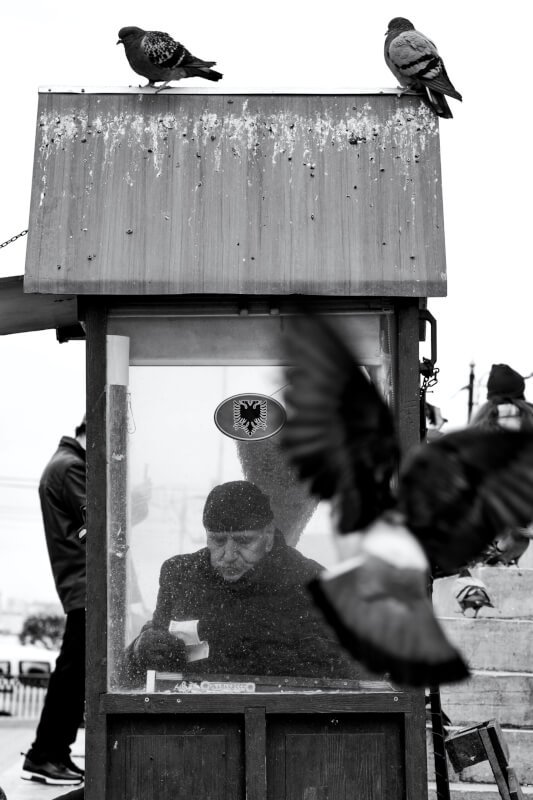Avian homeostasis, or the balance of physiological processes in birds, is crucial for their overall well-being and health. In this article, you will discover the best strategies to promote avian homeostasis, ensuring that your feathered friends lead happy and comfortable lives. From maintaining optimal temperature and humidity levels in their environment to providing a nutritious diet and plenty of mental stimulation, we will explore a range of practical tips that will help you create the perfect conditions for your avian companions. So, get ready to enhance the well-being of your birds and create a home where they can thrive!
Understanding Avian Homeostasis
The concept of homeostasis
Avian homeostasis refers to the ability of birds to maintain a stable internal environment despite fluctuations in external factors. It is a vital biological process that ensures the overall well-being and optimal functioning of birds. Homeostasis involves the regulation of various physiological processes, including temperature, hydration, nutrition, and metabolism, among others. Understanding how these processes work and the importance of maintaining balance is crucial for providing appropriate care to avian companions.
Importance of homeostasis for birds
Homeostasis plays a fundamental role in the health and survival of birds. By maintaining a stable internal environment, birds can effectively carry out essential bodily functions, such as digestion, respiration, and reproduction. It allows them to adapt to changes in their surroundings, such as extreme weather conditions, food availability, and predator threats. Proper homeostasis helps birds maintain optimal body temperature, hydration levels, and nutrient balance, ensuring their overall well-being and longevity.
Providing Optimal Nutrition
A balanced diet for avian homeostasis
Nutrition is a key aspect of avian homeostasis, as it directly influences metabolic processes, organ function, and overall health. When it comes to feeding your feathered friend, it is crucial to provide a well-balanced diet that meets their specific nutritional needs. This includes a combination of high-quality seeds, grains, fruits, vegetables, and protein sources. Consult with a veterinarian or avian nutritionist to ensure that the diet you offer is appropriate for your bird’s species and individual requirements.

Importance of hydration
Hydration is essential for maintaining avian homeostasis, as water is involved in numerous physiological processes. Birds lose water through respiration, excretion, and evaporation, so it is crucial to provide them with a constant supply of fresh, clean drinking water. Dehydration can lead to serious health issues, including organ failure and reduced immune function. Ensure that your bird’s water bowl is always filled, and regularly monitor their water intake to ensure they remain adequately hydrated.
Nutritional supplements for specific needs
In some cases, birds may require additional nutritional supplements to support their specific needs. This could include calcium supplements to ensure healthy bone development, vitamin D for proper calcium absorption, or omega-3 fatty acids for healthy feathers and skin. However, it is important to consult with a veterinarian before introducing any supplements into your bird’s diet, as excessive or improper supplementation can have negative consequences. A professional will be able to assess your bird’s unique requirements and recommend the appropriate supplements, if necessary.
Creating a Suitable Habitat
Temperature and humidity control
Maintaining the appropriate temperature and humidity levels in your bird’s habitat is crucial for their overall well-being and homeostasis. Most birds thrive in temperatures around 70 to 80 degrees Fahrenheit (21-27 degrees Celsius), with humidity levels between 40% and 60%. Ensure that your bird’s cage is placed in an area where it is protected from direct drafts, extreme temperature variations, and excess humidity. Use a thermometer and hygrometer to monitor the temperature and humidity inside the cage regularly, and make adjustments as needed.

Proper lighting
Lighting plays a significant role in avian homeostasis, influencing behaviors, hormone regulation, and overall health. Birds require exposure to natural sunlight or full-spectrum artificial lighting that mimics natural sunlight. Natural sunlight provides essential vitamin D, which is necessary for calcium absorption and overall bone health. Ensure that your bird’s cage is positioned near a window with filtered sunlight, or provide them with a suitable full-spectrum lighting system. Additionally, establish a consistent lighting schedule that includes periods of both light and darkness to mimic their natural day-night cycle.
Cage size and design
Providing an appropriate-sized cage is essential for promoting avian homeostasis. Birds require enough space to move, stretch their wings, and engage in natural behaviors. The cage should be large enough to accommodate the bird comfortably, allowing them to exercise and explore their environment. The bar spacing should also be adequate to prevent escape or injury. In addition to the size, the cage design should include perches, toys, and other enrichments, providing mental stimulation and opportunities for physical exercise. Regularly assess the cage and make necessary modifications to ensure the bird’s comfort and safety.
Maintaining Cleanliness and Hygiene
Regular cleaning of the cage
Maintaining a clean and hygienic environment is crucial for the health and well-being of your feathered friend. Regularly clean the bird’s cage by removing any waste, uneaten food, and debris. Use a bird-safe disinfectant to clean the cage bars, perches, and toys, ensuring that you rinse them thoroughly afterward to remove any residue. Change the cage liners regularly and provide clean bedding materials, such as newspaper or paper towels. By keeping the cage clean, you can minimize the risk of bacterial or fungal growth, respiratory issues, and other health problems.

Avoiding exposure to harmful substances
Birds are highly sensitive to toxic substances, and exposure to certain chemicals, fumes, and household products can have severe consequences on their health and homeostasis. Avoid using aerosol sprays, cleaning chemicals, and other products that may release harmful fumes or particles into the air. Keep your bird away from areas where tobacco smoke is present, as it can be extremely detrimental to their respiratory system. Additionally, be cautious with plants, as some can be toxic to birds if ingested. Familiarize yourself with common household hazards and ensure that your bird’s habitat is free from potential risks.
Bathing and grooming routines
Regular bathing and grooming are essential for avian homeostasis, as it helps birds maintain healthy feathers and skin. Provide your bird with opportunities for bathing, whether it’s through a shallow dish of water or misting them with a spray bottle. Bathing not only helps keep their feathers clean but also aids in regulating body temperature and removing excess oils. Additionally, ensure that you regularly trim your bird’s nails and beak, or seek professional help from a qualified avian veterinarian or bird groomer. Proper grooming routines are vital for your bird’s comfort and overall well-being.
Implementing Exercise and Mental Stimulation
Physical exercise opportunities
Just like humans, birds require regular physical exercise to maintain optimal health and homeostasis. Allow your feathered companion to spend time outside of their cage daily in a safe and supervised environment. This can include providing them with perches outside the cage, a bird-safe play gym, or even a larger space to fly, if possible. Encourage them to flap their wings, climb, and explore their surroundings. Additionally, consider providing your bird with access to bird-safe natural branches, which can offer additional exercise opportunities and promote natural behaviors.

Providing toys and enrichment activities
Mental stimulation is just as important for avian homeostasis as physical exercise. Birds are highly intelligent creatures and require mental stimulation to prevent boredom and maintain their overall well-being. Offer a variety of toys that are safe, chewable, and designed to encourage natural behaviors such as foraging, shredding, and problem-solving. Rotate the toys regularly to keep them fresh and exciting. Additionally, consider introducing puzzle toys or food-dispensing toys to engage your bird’s cognitive abilities and promote mental stimulation.
Social interaction with other birds
Birds are social creatures and thrive on social interaction with their own kind. If you have multiple birds, consider allowing them supervised time together to foster socialization and mental well-being. Birds enjoy companionship and can engage in activities such as preening, vocalizing, and playing together. However, it is important to introduce birds gradually and watch for any signs of aggression or stress. If you have a single bird, ensure that you provide plenty of social interaction with humans through talking, singing, and spending quality time together.
Ensuring Regular Veterinary Care
Importance of avian check-ups
Regular veterinary care is crucial for maintaining avian homeostasis and preventing potential health issues. Schedule routine check-ups with a qualified avian veterinarian to ensure that your bird remains in optimal health. During these visits, the veterinarian will perform a thorough examination, including checking your bird’s weight, beak, and feather condition, as well as evaluating their overall behavior and appearance. This allows them to detect any potential health concerns early on and provide appropriate treatment or preventive measures.

Vaccinations and preventative treatments
Vaccinations and preventative treatments are vital for protecting your bird from various diseases and parasites. Consult with your avian veterinarian to determine the appropriate vaccinations and treatments based on your bird’s species and potential exposure risks. Common preventative measures include vaccinations against diseases such as Avian Polyomavirus, Psittacine Beak and Feather Disease, and certain strains of influenza. Regular parasite prevention, such as treatment for mites and worms, is also essential for maintaining your bird’s health and homeostasis.
Detecting and treating illnesses
Avian species often mask signs of illness, making it challenging to detect health problems until they have progressed. Regular veterinary check-ups and attentive observation of your bird’s behavior are crucial for identifying any potential health issues early on. Look out for signs such as changes in appetite, weight loss, abnormal droppings, changes in vocalization or activity levels, and any physical abnormalities. If you notice any concerning symptoms, consult with your avian veterinarian promptly. Early detection and treatment of illnesses play a crucial role in maintaining avian homeostasis and ensuring the well-being of your feathered friend.
Promoting Emotional Well-being
Building trust and bonding
Building a strong bond and trust with your bird is essential for their emotional well-being and overall homeostasis. Spend quality time with your feathered companion, gently socializing, and building trust through positive reinforcement and rewards. This can include offering treats, engaging in gentle touch, and providing verbal praise. Avoid any negative reinforcement or punishment, as it can lead to fear and anxiety in your bird. By fostering a positive and nurturing relationship, you can help create a safe and emotionally secure environment for your feathered friend.
Recognizing signs of stress or anxiety
Stress and anxiety can significantly impact avian homeostasis and overall well-being. It is important to be familiar with the signs of stress in your bird and address them promptly. Common signs of stress include excessive feather plucking, vocalization, aggression, loss of appetite, and changes in behavior or body language. If you notice any of these signs, take steps to identify and eliminate the source of stress, such as environmental changes, a lack of mental stimulation, or inadequate social interaction. Seek advice from an avian veterinarian or animal behaviorist if necessary.
Creating a peaceful and stress-free environment
A peaceful and stress-free environment is crucial for promoting emotional well-being and maintaining avian homeostasis. Minimize exposure to loud noises, sudden movements, and other stressful stimuli that can trigger anxiety in your bird. Provide a calm and quiet space where your bird can retreat when they need a break from external stimulation. Maintain a consistent routine, as predictable schedules can help birds feel more secure. Additionally, ensure that your bird has access to a comfortable and secluded sleeping area, as quality sleep is essential for their emotional and physical health.
Reducing Environmental Hazards
Avoiding exposure to toxic substances
Birds are highly sensitive to toxic substances, and exposure to certain household items and chemicals can have severe consequences on their health. Ensure that your bird’s environment is free from toxic substances such as household cleaners, pesticides, lead-containing materials, and certain plants that may be toxic if ingested. Use bird-safe cleaning products and avoid using chemicals around your bird’s habitat. It is always better to be cautious and ensure that any items within your bird’s reach are safe and non-toxic.
Preventing accidents and injuries
Accidents and injuries can disrupt avian homeostasis and potentially lead to serious health problems. Take necessary precautions to prevent accidents within your bird’s environment. Ensure that their cage is secure and free from any hazards such as loose wires, sharp objects, or edges that could cause injury. Keep windows and doors closed to prevent accidental escape or injury from flying into glass. Supervise your bird whenever they are outside their cage to minimize the risk of accidents. By creating a safe and protected environment, you can reduce the likelihood of accidents and support your bird’s overall well-being.
Eliminating excessive noise and pollution
Excessive noise and pollution can negatively impact avian homeostasis and overall health. Loud noises, such as construction work, loud music, or excessive chatter, can be extremely stressful for birds and disrupt their normal behaviors. Minimize exposure to excessive noise or provide a quiet and secluded space where your bird can retreat to when needed. Additionally, ensure that your bird’s habitat is located away from sources of pollution such as smoking areas or heavily trafficked roads. Clean air and a peaceful environment are crucial for maintaining avian homeostasis and promoting a healthy and happy bird.
Providing Adequate Sleep
Understanding avian sleep patterns
Just like humans, birds require adequate sleep to maintain optimal health and homeostasis. Understanding avian sleep patterns is essential for providing an appropriate sleeping environment for your bird. Most birds have a diurnal sleep-wake cycle, meaning they are active during the day and sleep at night. However, it is important to note that birds may have different sleep patterns based on their species and natural habitats. Some birds may engage in short periods of sleep throughout the day, while others may require uninterrupted sleep at night. Observe your bird’s behavior and adjust their sleeping routine accordingly.
Creating a quiet and undisturbed sleeping area
To promote quality sleep and avian homeostasis, it is important to provide a quiet and undisturbed sleeping area for your feathered companion. Choose a location in your home where your bird will experience minimal disturbances during their sleep. Cover their cage partially or completely with a breathable fabric or bird-safe cage cover to create a dark and cozy sleeping environment. This can help mimic their natural sleeping conditions and promote better quality sleep. Avoid sudden loud noises or disruptions around their sleeping area, as it can disturb their sleep patterns and overall homeostasis.
Establishing a consistent sleep routine
Establishing a consistent sleep routine is vital for maintaining avian homeostasis and promoting a healthy sleep-wake cycle. Birds thrive on routine, so establish a regular bedtime and wake-up time that aligns with their natural sleep patterns. Provide a quiet and calm environment at least an hour before their designated bedtime, allowing them to wind down and prepare for sleep. Similarly, ensure that they receive adequate exposure to natural daylight or full-spectrum lighting during their waking hours to support a healthy sleep-wake cycle. Consistency is key when it comes to promoting adequate sleep and maintaining avian homeostasis.
Monitoring and Adjusting Environmental Factors
Observing bird behavior and signs of discomfort
As a responsible bird owner, it is important to closely observe your bird’s behavior and body language to identify any signs of discomfort or potential environmental issues. Regularly monitor their eating habits, vocalizations, behavior changes, feather condition, and overall vitality. Signs of distress or discomfort can indicate underlying environmental factors that may need adjustment or veterinary attention. Remain attentive to any subtle changes in your bird’s behavior and take appropriate measures to address their needs. By being observant, you can proactively maintain avian homeostasis and ensure your bird’s well-being.
Maintaining proper humidity and ventilation
Proper humidity and ventilation are essential for maintaining avian homeostasis and ensuring optimal respiratory health. Most bird species thrive in a humidity range of 40% to 60%. Use a hygrometer to monitor the humidity levels in your bird’s habitat and make adjustments as needed. Ensure that the environment is not excessively dry or humid, as both can lead to respiratory issues. Additionally, provide adequate ventilation to promote fresh air circulation within the cage, while avoiding drafts or direct exposure to cold air currents. Proper humidity and ventilation contribute to a healthy and balanced environment for your feathered companion.
Optimizing the bird’s surroundings
Optimizing your bird’s surroundings involves creating an environment that supports their natural behaviors, preferences, and overall health. Consider their species-specific needs and replicate their natural habitat as closely as possible. Provide appropriate perches, branches, and toys that encourage physical and mental stimulation. Offer a variety of textures, hiding spots, and foraging opportunities to keep your bird engaged and mentally stimulated. Regularly assess and adjust their surroundings based on their preferences and needs. By optimizing their environment, you can contribute to their overall well-being and assist in maintaining avian homeostasis.
Promoting avian homeostasis is a multifaceted task that requires a comprehensive approach. By understanding the concept of homeostasis and its importance for birds, providing optimal nutrition, creating a suitable habitat, maintaining cleanliness and hygiene, implementing exercise and mental stimulation, ensuring regular veterinary care, promoting emotional well-being, reducing environmental hazards, providing adequate sleep, and monitoring and adjusting environmental factors, you can create a nurturing and balanced environment for your avian companion. By prioritizing their well-being and homeostasis, you are setting the stage for a joyful and fulfilling life together.

